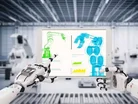Software for the smart factory: The advantages of hardware-independent software

According to the Smart Factories and the Modern Manufacturer report, investments in smart manufacturing are set to drive a 27 per cent increase in efficiency over the next five years, boosting the global economy by a colossal $500 billion. Here, Lee Sullivan, Regional Manager for industrial automation software expert, COPA-DATA UK examines one of the key choices manufacturers will make during their digital transformation — choosing the right software.
The term ‘smart factory’ describes an industrial facility that leverages internet-connected technology to improve manufacturing processes. Central to the success of a smart factory is the technology that makes data collection possible, the sensors embedded in industrial equipment and, importantly, the industrial software to collect and analyse the data to ensure that the correct decisions are made to improve the factory's KPIs.
Easy integration
Typically, a manufacturing facility will comprise an array of equipment. Usually, these machines will differ in terms of vendor, age and the communication standard used. These environments mean that, to collect the necessary data for smart manufacturing, the hardware within the facility, like programmable logic controllers (PLCs), human machine interface (HMIs) panels, consumption devices or PCs need to be communicated with at the same time – a difficult task for machinery and facilities designed on varying communication standards.
Successful integration of these devices does not require a complete equipment overhaul for the manufacturer. Instead, organisations should consider choosing software that is platform independent. In an industrial environment, ‘hardware-independent software’ describes software that can be implemented into any industrial automation system, regardless of the hardware used in the facility.
Truly independent software can be integrated seamlessly into any device within the facility — irrespective of the age or manufacturer of the equipment. COPA-DATA’s zenon, for example, provides over 300 native communication protocols. With this flexibility and versatility, manufacturers have the freedom to quickly integrate new or existing shop floor machines, new buildings or production areas into the data system, regardless of the communication standard used. Zenon also supports all common standards, including OPC UA, Modbus RTU, TCP, Open Modbus and more.
Reduced downtime
Choosing industrial software that runs on a variety of different communication protocols means that manufacturers can reap the benefits of a SMART factory, for example, they can scale the system to visualise the full value stream map over time. However, the benefits of scalability go beyond improved flexibility.
Production downtime is a costly inconvenience for any manufacturer. In the food processing industry, unexpected production stoppages can create a significant drain on budgets and logistical resources. Usually, if an HMI panel is damaged or fails during production, the machine cannot be operated and the entire production line must stop.
Waiting on the delivery of a new HMI panel that can run the same software and projects is not always a viable option. However, using automation software that is truly independent means that any generic HMI panel can be used as a replacement.
Hardware-independent software can run on different hardware platforms, regardless of the screen resolution. For manufacturers, this means that in the event of a HMI failure, any generic HMI panel can be used as an interim solution.
Furthermore, the lifecycle of the zenon project within the damaged HMI is also easily maintained as the project can then be upgraded and installed onto a newer operating system. This is a huge benefit because it not only minimises the risk of obsolescence but importantly ensures a safer facility with improved cyber security.
Future flexibility
Extensibility is also a key requirement of the smart factory. The ability to internally optimise factories to provide growth through the open platform of zenon ensures that improvements can be added at any time, using specific modules.
From the perspective of a systems integrator or an original equipment manufacturer (OEM), choosing hardware-independent software can remove future limitations for both themselves and for their customers — and potentially grow their business into new industry sectors.
Systems integrators are often faced with the challenge of searching the marketplace for industrial software for each of its separate projects. Choosing software that is platform independent gives customers a more flexible approach to automation architecture. This way, systems can be designed in a way that best fits the facility and can be changed quickly and cost-effectively. This method can also reduce the time and costs associated with internal training for different systems.
76 per cent of manufacturers either have a smart factory initiative in place, or they are currently working on formulating it. However, 39 per cent of manufacturers admit that they are struggling to successfully implement their smart manufacturing initiatives. As a key enabler for the digital transformation of manufacturing facilities, choosing the right software should not be an afterthought.

